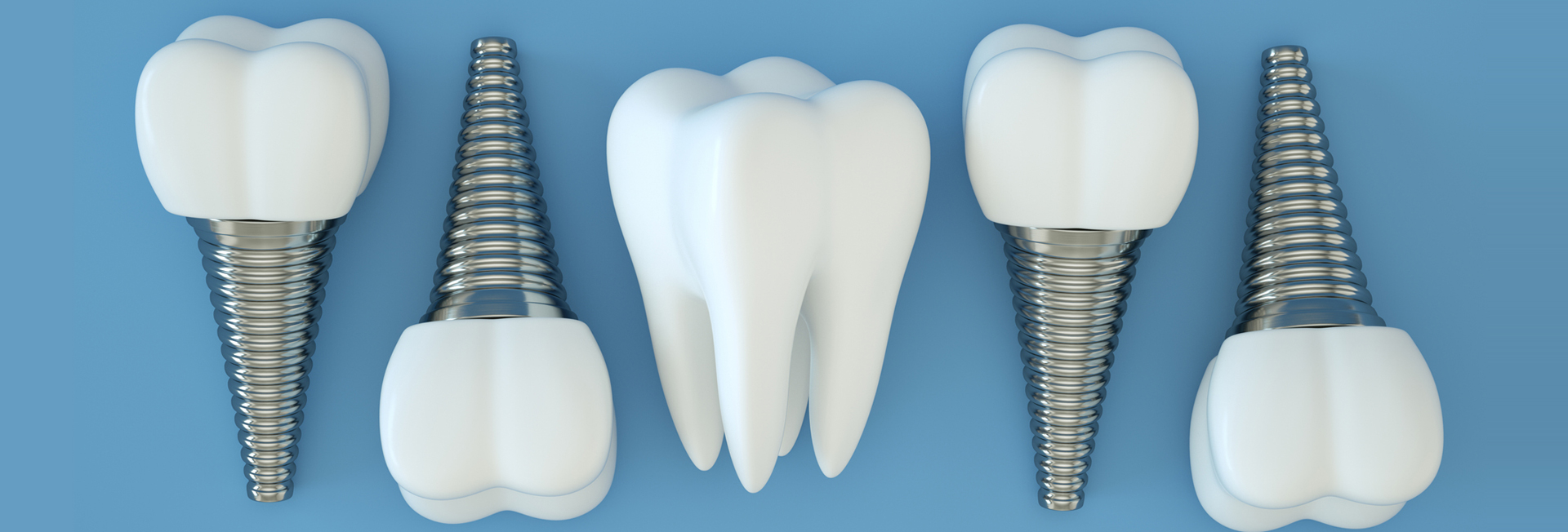All About Dental Implants
What is a Dental Implant?
A long-term solution for filling a gap. Dental Implants look and feel like real teeth. They are a substitute for your natural tooth.The implant acts as an artificial root which is attached to your jaw bone with the help of a titanium screw (the implant). They not only look like the original tooth root but they also act as the original tooth root.A post is connected to the implant on which a new tooth (crown) can be built.
Unlike bridges and dentures, which require special cleaning instructions and extra attention, dental implants need regular brushing, flossing and dental hygiene appointments, just like your natural teeth.
Implants can be used to replace single or multiple missing teeth.
The benefits of Dental Implants for missing teeth
- Aesthetics – if you have implants no one can tell your teeth aren’t your originals.Dental implants should be indistinguishable from your surrounding natural teeth.
- Function – they function just as well as your own natural teeth: you can eat the foods you want and speak with complete confidence.
- Eating – enjoy the foods you want with complete confidence and not having to worry about loose dentures falling out.
- Healthy teeth – improved oral hygiene: dental implants just need regular brushing, flossing and dental hygiene appointments, just like your natural teeth.
- No preparation of adjacent teeth-by replacing lost teeth with an implant, no support is required of the adjacent teeth, and your natural teeth do not need to be prepared or altered in any way.
- Bone growth – a dental implant placed in that area can actually stimulate bone growth and production, preventing loss of valuable bone structure.
Why choose Horbury Dental Care for Dental Implants
- We strive for excellence in clinical standards and customer service, whilst adhering to the caring family values and offer the highest standards of single and multiple tooth replacements, as well as over-denture cases.
- We only employ modern main-line implant systems, backed by good clinical data.
- We are an established family practice here to support and look after you throughout your treatment and will help you to maintain the care of your beautiful new teeth not just now, but well into the future.
Dental Implant FAQs
Please call our reception team, who will explain the different treatment options and answer any of your questions. Alternatively you can use our online enquiry from and one of our team will be in touch with you. call us on 01924 211234.
Dental implants are fixed in place to support crowns, bridgework and dentures and they look, feel and function like natural teeth and this often increases your self-confidence and self-esteem.
As the implants are installed under local anaesthesia, you will not feel any pain during the surgery. The treated area may be swollen for a few days afterwards, which could be slightly painful. In most cases an ordinary painkiller is all you may need to feel fine.
Yes! They function as your ordinary teeth when you are chewing, talking and laughing. Most people do not see or feel any difference between their natural teeth and their new ones.
Yes, of course! With dental implants you don’t have to sacrifice healthy teeth to restore missing ones. Unlike conventional bridges or partial dentures, no adjacent teeth are affected or needed for support.
Your age is normally not relevant – more important is your health. There is no upper age limit. However, if you are under 18 years of age, you must be examined to make sure you have finished growing before you can undergo implant treatment.
Titanium is a metal accepted by the body. The process by which the bone grows onto the metal in a very close integrated way is known as osseo-integration.
It depends on your dental health and the exact treatment that is best for you. Some people need only one operation, while others need more. Every treatment plan is bespoke and unique to each patient.
On occasion implants can fail, the risk of failure is approximately 1%-5% depending on specific circumstances. At Horbury Dental Care we have a low failure rate of 2%. If an implant fails it can generally be replaced, occasionally additional procedures may be required. There is also a risk of accidental damage to adjacent anatomic structures such as teeth, though with accurate planning this should be avoidable.
There is a low risk of failure of implants after the first years in function as long as your health, both general and around the implant is maintained and no excessive forces are exerted. Excessive forces may result in some of the component parts fracturing. Implants and teeth are subject to wear and tear as time goes on and depending upon the amount of wear, the need to replace the crown may arise. There is a risk of gum recession around the implant and though this may not affect its survival, it may require treatment for aesthetic reasons.



